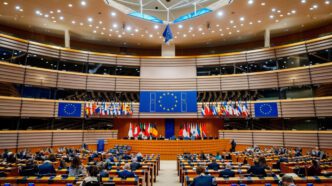Executive Summary
The Story So Far
Why This Matters
Who Thinks What?
Members of the European Parliament in Strasbourg on Wednesday rejected a significant proposal aimed at streamlining regulations for businesses, a move that delays the legislative effort and sets up a potential conflict with the European Commission and EU leaders pushing for rapid deregulation. The unexpected vote, held via secret ballot, reflects deep institutional divisions within the Parliament regarding the extent to which the European Union should scale back its existing laws.
The decision came as a surprise, particularly after the Parliament’s centrist political groups had reportedly reached an agreement to support the measure two weeks prior. Out of 661 lawmakers who participated, 318 voted against the proposal, 309 were in favor, and 34 abstained.
The use of a secret ballot, advocated by the far-right Patriots group, allowed individual MEPs to vote against their group’s official stance without public repercussions, contributing to the unexpected outcome.
The Proposed Deregulation Package
Proposed last February, the rejected “omnibus bill” sought to reduce reporting obligations for companies, particularly those stemming from the bloc’s sustainability disclosure and supply chain transparency rules. This initiative represents the first in a series of proposals from the Commission, under President Ursula von der Leyen, designed to cut red tape and enhance the competitiveness of EU industries.
Earlier this month, major centrist groups—the European People’s Party (EPP), Renew, and the Socialists and Democrats (S&D)—had agreed on a compromise to roll back some reporting obligations. However, these negotiations were marked by significant disagreements, particularly concerning the extent of corporate legal liability for human rights and environmental violations in supply chains, and whether companies should be mandated to have transition plans for meeting Paris Agreement emissions targets.
Political Fallout and Future Prospects
The rejection opens the door for all political groups to re-propose amendments to the centrist compromise, pushing the next plenary vote to November. European Parliament President Roberta Metsola acknowledged the deep divisions, stating, “Today’s vote showed that for a huge section of the Parliament, this compromise simply did not go far enough, and for some sections, it went too far.”
The Patriots group expressed optimism that the EPP would now seek compromise with right-wing parties to further reduce EU regulation, aiming for a “truly business-friendly framework.” Conversely, Greens MEP Kira Marie Peter-Hansen viewed the outcome as an opportunity to strengthen, rather than weaken, Europe’s sustainability and due diligence rules.
The delay in approving the omnibus package is likely to frustrate EU leaders, who have been pressing Brussels for swift action on deregulation. Draft conclusions obtained by Politico indicate that leaders are urging for the package’s approval before the end of the year.
Leaders from 19 EU member states, including Germany, France, and Italy, recently called for a “constant stream” of proposals to simplify the bloc’s rules and boost their economies, according to a letter also obtained by Politico.
Lead negotiator Jörgen Warborn of the EPP expressed disappointment, noting that a prior agreement had not held. While declining to comment on potential alliances with the far-right in November, he placed the onus on S&D to clarify its position.
Renew MEP Pascal Canfin indicated that his group would re-table the same compromise, asserting it was “the best possible deal.” President Metsola emphasized the importance of building majorities “from the center out” to advance Europe.
The European Parliament’s rejection of the initial red tape cutting proposal underscores the persistent tensions between the desire for increased business competitiveness and the commitment to environmental and social standards. As the legislative process is prolonged, the search for a consensus that balances these competing priorities will continue to be a central challenge for EU institutions.








